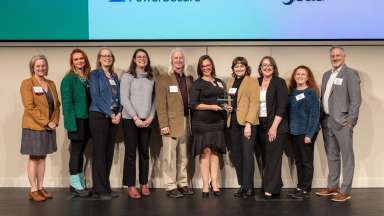The award-winning Solarize the Triangle program helps homeowners, businesses, and nonprofits obtain volume discounts on clean energy materials and installation services. That, in turn, helps them become more resilient, reduce energy expenses, and save on the cost of renewable energy systems.
The City of Raleigh ran the community-wide pilot program in 2022-2023. We are currently piloting the second phase using federal funding to subsidize solar installations on low-income residents’ homes. Staff will explore opportunities for future initiatives after the pilot phase ends.
The City partnered with several local governments, organizations and non-profits across the Triangle to create this program. Raleigh’s local government partners include Durham, Apex, Cary, Carrboro, Chapel Hill, Hillsborough, and Morrisville, along with Chatham, Durham, and Orange Counties. The program, now closed, saw more than 2,000 participants and led to hundreds of new solar installations.
Program Achievements:
- Broke National Records: Largest Solarize campaign in the U.S.A.
- Award: “Cleantech Impact: Local Government” from the Research Triangle Cleantech Cluster (Nov 2023); this award recognizes “a local government or governments that have effectively leveraged resources and partnerships to complete an innovative project or initiative deploying cleantech solutions to create positive impacts for the environment, economy, and residents.”
- Award: “Climate Action Award for Energy” from Raleigh’s Environmental Advisory Board (April 2024); Solarize the Triangle was awarded for their impactful work on climate action and addressing energy burden in Raleigh and across the Triangle. Several local government representatives accepted the award Raleigh’s 2024 Earth Day celebration and Environmental Awards ceremony at Dix Park.

Members of the Triangle Sustainability Partnership, Yes Solar Solutions, and Solarcrowd Source accept the Local Government Impact Award; learn more: https://www.centralpinesnc.gov/pressreleases/solarize-triangle-recipient-research-triangle-cleantech-cluster-2023-cleantech
Solarize the Triangle Community Impact:
- 321 contracts signed
- $570,607 in annual utility bill savings
- $10.92 million invested in clean energy development
- 5.92 million pounds of CO2 emissions reduced annually
- 3,155.3 kilowatts of new clean energy capacity
- 4,389,291 kilowatt hours of annual energy production
Solarize Low-to-Moderate Income Pilot Program
Low-to-moderate income households often spend a large proportion of their income on energy costs. And while solar systems could significantly reduce their energy bills, they are often unable to invest in them (and save money over time).
The Solarize the Triangle program is the first of its kind to pilot this type of program. The City of Raleigh is using federal funding from the federal American Rescue Plan Act (ARPA) to subsidize and install solar systems for low-to-moderate income Raleigh residents. The pilot program aims to lower costs for these households and provide them with clean, affordable energy.
Programs like this one increase access to clean energy and contribute to a higher quality of life. City of Raleigh Sustainability Director Megan Anderson emphasizes the program's dual benefits of reducing greenhouse gases and increasing community benefits. “Your bills are lower. You’re able to afford other things you need. And if there’s an emergency and the power goes out, you can stay in your home longer because you have solar. So, there are a lot of reasons why this is a high-impact program and important to the community.”
Looking Ahead
The Solarize program phase is now closed, but the success of Solarize the Triangle has paved the way for future efforts to increase access to clean and affordable energy. The City and our partners are committed to exploring new ways to promote solar and other clean technologies, particularly for low-to-moderate-income households and for those living in affordable housing. We are working to ensure that the benefits of renewable energy are accessible to all.